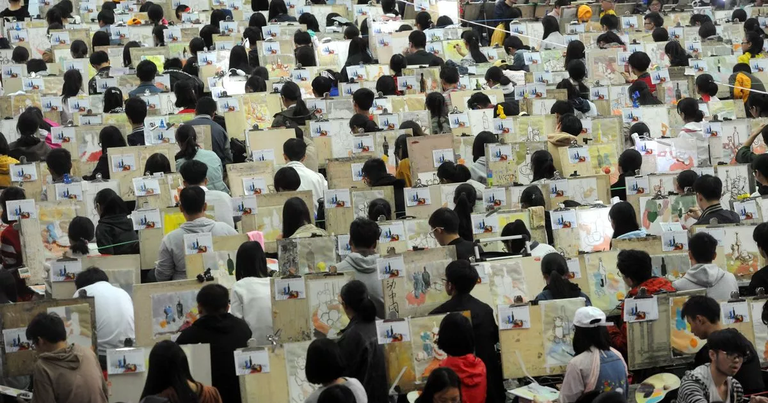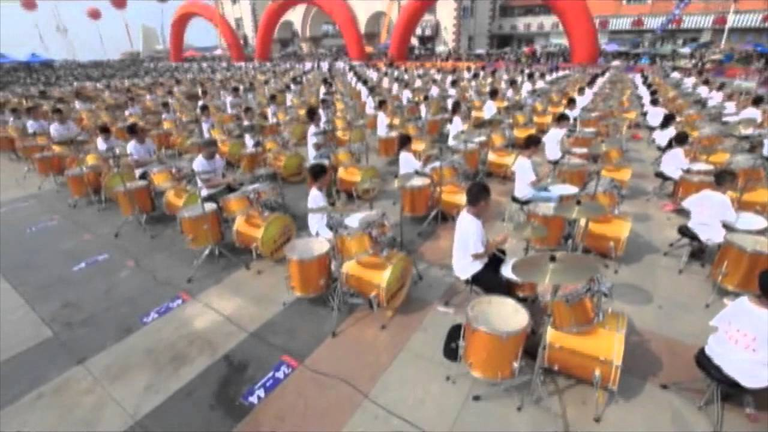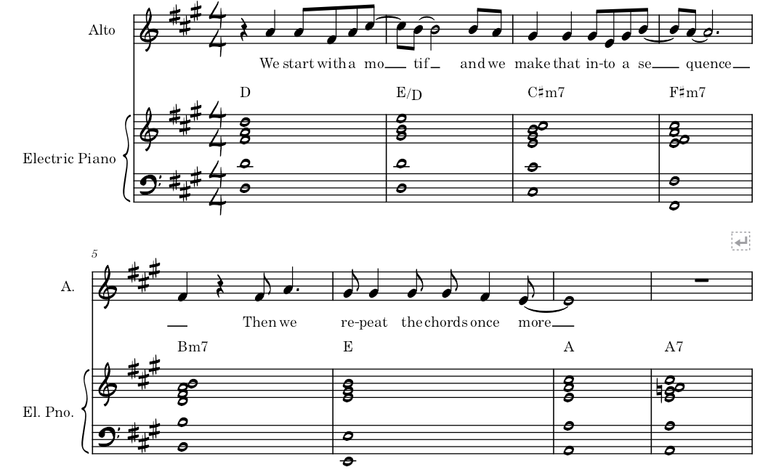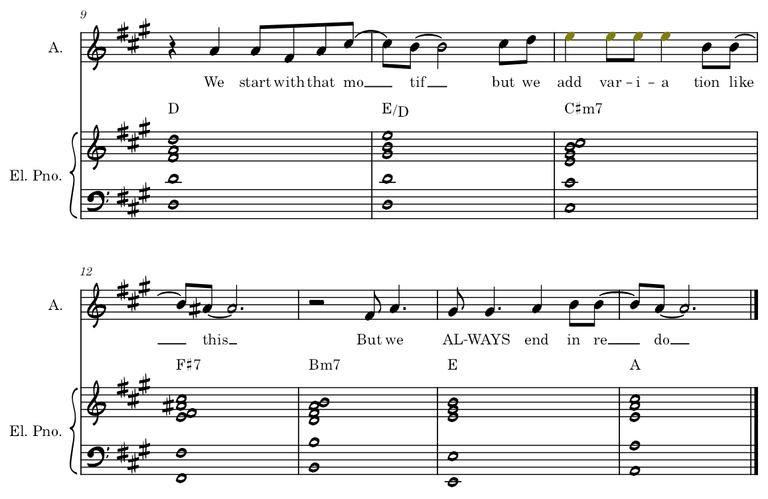Think Pop Music is Samey? Oh, you have no idea.
You know in western pop music how, for decades, there was this infectious disease that still prevails to this day though less so, the infamous four-chord progression. The I-V-vi-IV progression.
Or, put another way, C --> G --> Am --> F - Or the same thing in any other key.
There is even a viral medly online by the axis of awesome showing how you can just learn these four chords and unlock the door to thousands of songs. It's sickeningly cliche at this point, but its still used.
Well, China has a similar problem, but it's far more pervasive and, well, shit. lol.

In terms of technicality, or just 'number of chords', the Chinese version is a bit more interesting, in principle, but in practice, it's far more insufferable.
I think the reason is that it's not all about the progression itself, but the instrumentation, the melody, and just how stringent rules are stuck to almost as if every C-pop song was a high school music theory class project students are trying to demonstrate their knowledge over the final semester, and they've all followed the heavily standardised curriculum to the minute details of every dotted i and every crossed t.
Whenever I go to a Chinese restaurant, I'm increasingly distraught at the background music nobody else is even listening to. Every. Single. Song. Has the exact same chord progression, and basically the same melody, which invariably ends on re-do. Invariably. It is a hardwired rule that must never be broken, for some reason.
In the West, they may have had a period of this four-chord insufferable curse, but at least musicians tried to innovate with that limitation to all kinds of extremes. We also had the luxuty of an absolute cacophony of genres filling every nook and cranny, from heavy metal to hip hop, all of which would influence the pop genre generally.
But not here. Of course, there are other styles, but C-pop is its own thing in complete isolation, from the rest, and utterly, sickeningly omnipresent.
So what is this progression of which I speak?
IV --> V7 --> iii --> vi --> ii --> V --> I--> V/IV
4 ------> 5 -----> 3 ----> 6 ---> 2 ---> 5 ---> 1 ----> 1
Or more specifically, let's use A major:
D --> E/D --> C#m7 --> F#m7 --> Bm7 --> E --> A --> A7
Try it out on piano or whateverr and I bet any musician will have heard it plenty.

There are a few little variations from song to song, but they still very, very stringently stick to the kinda of AP Music Theory standards of theory practice, very high school-y in nature. There is no adventure, no experimentation. They might, for example, swap out the 'vi' (F#m7) with a V7/ii (F#7) Which only has one note different. Typically they'll use that on the second go around a chorus or something.
It just feels like... well, like if you're an art student in China taking an exam, and you enter the stadium like hall and see this:

Or you're taking drum lessons and walk in to see this:

I feel there must surely be something going on like this when it comes to the mass production-isation of Chinese pop music.
It incinerates any rogue creative with a death ray immediately, leaving only the obedients to walk the well-trodden path for generations to come.
Here's what a melody will DEFINITELY SOUND LIKE next time you listen to a C-pop song:


Why?
THere's actually a pretty good reason whoever the CEO of Music is in China decided to go with this single progression. For one, sticking with a single thing makes it familiar to an ungodly level to anyone who wants to sing along.
It's like naming your child John. Nobody questions it when introduced. John, got it. Easy.
But if you start naming your kids Cleopteryx, people are going to second guess what the fuck they just heard, and you start making judgements about that person and their upbringing, conversations happen, and suddenly more thought into something happens than you want.
But on a strictly musical perspective, this is a very good choice to accomplish that goal.
You see, the V-I (or, So-Do, or G-C) progression is a very powerful one, I've probably talked about it before. It's used in Jazz, most often as a ii-V-I, and all classical music throughout history uses V-I to finish off a musical phrase or movement or anything else, in the form of an 'Authentic cadence'.
It is known as the most 'final' sounding of the cadences, it feels like arriving at home. It's a tension and release. It's satisfying.
Well you don't need to use the V-I limited to the specific key to get that kind of effect. You can venture all over the place with it, especially with the ii-V-I movement, and you'll find whether it's Chinese, Western classical, modern pop, or anything else, it's pretty hard to escape it.
But this progression is just a long chain of V-I's, or ii-V-I's.
to be clear, in A major like the above example, a V-I would be E --> A, because E is 5 chords above A (in the alphabet, E is 5 letters above A, simple as that).
But if you were to put different V-I's through the whole progression, well there can never be too much of a good thing, right?
First up, on the top line, you have C# --> F#. Well: F-g-a-b-C. C is 5 steps above F, so there's our first V-I type of movement.
If we continue look one chord ahead: C# --> F# --> B, well, now the C# is ii, the F# is V and the B is 1 (B-C-d-e-F)
This is our ii-V-I. Every next chord you look at creates a new ii-V-I all the way to the end of the progression. The next chord is E. Well, F# is ii, and B is V. (E-F-g-a-B). And so on.
So it's basically a cycle of the most trite, cliche set of chords going around and around what we musicians call the circle of fifths.
When used creatively, it's an eternally fascinating and exciting practice. But when you stick to a single, most simple, high school variant like this, it becomes about as cheesy as Brie.
Add to that the melody which, as my lyrics above explain, use the exact same melodic techniques (motif-sequence, ending on a re-do suspension, land on the raised 3rd for a secondary dominant variation), and you have yourself a pure, cookie-cutter, factory mass produced piece of music everybody can mindlessly sing along to, or, have played in every single restaurant in the nation to fill the silence and muffle the noise of plates clanging, without anyone except me thinking about it.
And yet, people still go to sell-out stadium concerts of clone-like singers, indistinguishable from one another, as they churn out 3 hours of song-after-song-after-song of this exact progression. Over and over. I'm not exaggerating.
I really wish I had the capacity to make some viral tiktok video that got noticed by the top artists who decide i'm right and it's time for change.
But I don't, so I'll just whine on here instead.
Well, if you're curious, I've collated a few examples for you to Check out and see if you can hear what I'm rambling on about:
This is the VERY FIRST result when you search 'Chinese pop music' 中国流行音乐 into Youtube. Not only is it the exact chord progression I am talking about, but it's even in the same key of D as per my example lol. God, come on guys do better.
Here's the SECOND result, the massive Jay Chou:
The chorus is, of course, the EXACT progression above... ALSO IN D lol. You'll also notice he ends the chorus in that suspension 'Re-do'
Well, you get the idea.
To be clear:
There's a lot of music in China that doesn't fit under the umbrella of C-pop. There's far worse, more hilarious music, but also much better, often putting an Eastern spin on Western music, which is alright. But it's much harder to hear this stuff walking around and living in the city streets. It's almost like hearing Wham!'s Last Christmas in december as you go to the christmas markets and shopping malls, but it's year-round, and everywhere. Yes there are other non-christmas songs, but good luck hearing them!
I have never heard a full Chinese song before except short clips from Chinese movies, and you wrote so much here, which I have never heard of.
I am glad I stumbled across your post. Tha ks for sharing all that you did.
Thanks for stopping by - these musical posts I do are pretty universally unpopular but I'm gonna keep doing them anyway - always good to see anyone come along and check it out!
You are welcome 😁. Well, keep doing them because you'll always find your audience and
... if you want more spotlight on your posts, you can check out dreemport.com.
It is a community on Hive with so much to give. Happy New Year 🎉.
Axes of Awesome....is Awesome
And I love the Last Christma comparison, well I actually like the whole write-up. But the songs are like Chinese for me.
I mean I just deal badly with bubble gum pop in most cases, but as I have no clue about chords I can´t say that the songs I choose as awesome are any better constructed, they just sound like they are !LOLZ
lolztoken.com
It is pretty hot
Credit: reddit
@mobbs, I sent you an $LOLZ on behalf of whywhy
(2/2)
Delegate Hive Tokens to Farm $LOLZ and earn 110% Rewards. Learn more.
That's all that really matters eh? To be honest if I was convinced Chinese people loved Chinese pop passionately, then I'd begrudgingly accept it, but I just know it's 98% about the handsome or beautiful singer's image, the music just an inconvenient byproduct nobody is actually listening to.
Same can be said for western pop, just far less extreme. But like, if I listen to any top charts of the west these days, it's all that really annoying latin hiphop... and they sound even more copy-pasted than the above Chinese!
But I at least understand what they are saying in those Latin tunes. But indeed Pop music was bad already but has become mass-produced marketing but on the other hand with the current options I am able to discover many more great music that does not make the charts then back in the day
You gotta make the effort yourself these days to find the good stuff. It's like how restaurants are trying to have us self-serve everything, and supermarkets trying to make us self-checkout XD
!LOLZ you goy a point there, but I enjoy diving into a musical rabbit hole a lot more than self check out at the supermarket
lolztoken.com
No one, it happens Autumnatically.
Credit: reddit
@mobbs, I sent you an $LOLZ on behalf of whywhy
(1/2)
Farm LOLZ tokens when you Delegate Hive or Hive Tokens.
Click to delegate: 10 - 20 - 50 - 100 HP
That is an unusually complicated chord structure for everyone to be copying! Wow!
I mean, compared to four chords yeah but it's like some kind of clapping rhythm game little kids play together. It looks complicated but they practiced it 30 times and now they can just do it for the rest of their lives without thinking.
And tbh, the things we can do with 4 chords in contrast is actually pretty impressive in itself!